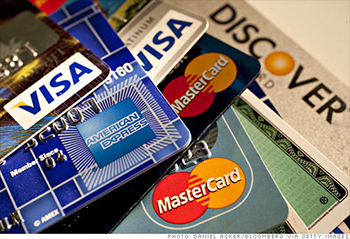
When used responsibly, a credit card can be a beneficial financial tool. Making regular credit card payments can help improve your credit rating, and some credit cards even offer airline miles or cash rewards for purchases. But if credit card spending gets out of control, monthly payments and accumulated interest can become a problem.
Follow these tips to avoid common credit card pitfalls.
1. Pay off your balance every month. You can avoid paying interest on your credit card purchases by paying the outstanding balance in full each monthly billing cycle. As long as you pay off your balance at the end of every cycle, you’ll never pay an interest charge (which may not be true for balance transfers and cash advances). Resist the temptation to spend more than you can pay off each month, and you’ll enjoy the benefits of using a credit card without interest charges.
2. Use the card for needs not wants. A credit card should be used with discretion, since frivolous purchases can lead to debt. Credit cards can be used in emergency situations, such as a mobile phone bill that is due before your next payday. Use the credit card as a temporary loan to yourself, and then pay back the amount as soon as possible to avoid accumulating interest charges.
3. Never skip a payment. If you have accumulated a significant credit card balance, there are ways to get out of debt. An important piece of credit card advice to remember is to never skip a payment. Pay your bill every month, even if you can only afford the minimum payment. Missing a payment could result in a late payment fee, a higher interest rate and a negative mark on your credit score.
4. Use the credit card as a budgeting tool. If you feel confident that you can use a credit card responsibly and pay off the balance every month, try using it as a budgeting tool. By making all of your purchases with your credit card, you can see exactly how much you’ve spent at the end of every month. Of course, you should only do this if you’re confident you can pay off the balance each month. To make sure your credit card spending doesn’t get out of hand, never charge more to your card than you have saved in your bank account.
5. Use a rewards card. If you’re using a credit card for most or all of your purchases, make sure to find a card that offers rewards. Not only will you avoid paying interest on your purchases if you pay off the balance every month, you’ll also earn rewards such as cash, airline miles or retail points.
6. Don’t exceed 30% of your total credit limit. One way to keep your credit score healthy is to make regular monthly payments on time. Another is to keep your credit utilization ratio under 30%. The credit utilization ratio is the percentage of total available credit that you’re using. For example, if you have a credit card with a limit of $1,000, you should keep your balance under $300. But remember that the ratio applies to the sum all of your cards. So if one credit card has a $3,000 limit and a $3,000 balance, and a second credit card has a limit of $7,000 with no balance, you’re right at the 30% utilization mark ($3,000 of an available $10,000).





